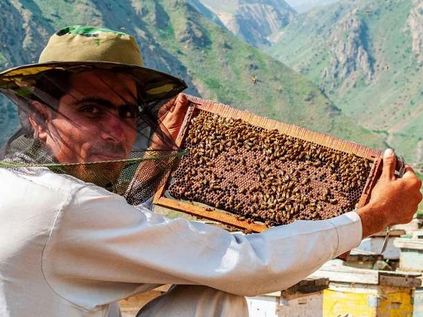PESHAWAR, Jul 13 (APP):The climate change induced weather patterns have started adversally affecting beekeeping business in KhyberPakhtunkhwa where experts call for whopping plantations of ber and palosa plants to save local honeybees of possible extinction.
Malyar Khan, a 28 years old beekeeper was among those affected by climate change weather pattern, asking his brothers to hurry up in shifting of bees boxes after floodwater in River Kabul inundated his village in Nowshera district.
Shifting bees colonies at pickup from Mohib Banda village to a safer place, Malyar, his brother Hussain and Kamal were working against the clock to shift all 500 bees boxes to avert potential loss from floods during monsoon season.
“When I wake up, i have seen over half of vees colonies were inundated by the flood water, forcing us to shift to safer place” he said, adding 2022 floods in River Kabul have washed away 300 bees boxes.”
Kamal has worked hard to recover the losses and raised 500 bees boxes after taking loan.
Like Kamal, beekeepers of Khyber Pakthunkhwa were highly vulnerable to climate change induced weather patterns, urging KP Govt to provide interest free loans to the affectees.
Iftikhar Khalil, former Director Apiculture, Forest Development said that bees population were highly vulnerable to climate change in Khyber Pakhtunkhwa.
He said heavy rainfall and hailstorms can destroy the flowers, and erratic rainfall and high temperatures during the monsoon flowering season can stop them from blooming, thus affecting honey production.
He said when the flowers disappear, the bee population declines because they cannot find nectar, resulting in reduced honey production.
Bees are threatened in world by changing weather patterns, intensive farming practices, land-use change and pesticides besides vanishing of ber and palosa plants.
He said their loss threatens not just the honey trade but food security in general, with a third of the world’s food production dependent on bee pollination.
He said wild bees are under heightened danger due to deforestation and climate change weather patterns and if proper attention was not given to their preservation and management of natural forests their population would vanish in a few decades.
Iftikhar said that two queens in the same colony cannot live together as the younger queen often kills the elder or the latter leaves the colony in fear of sharing food.
Iftikhar Khalil, former Director Apiculture/NTFP said Pakistan was a home to four famous honey bees including Apis Cerana (small bee), Apis Dorsata (wild bee), Apis Flori (little bee) and exotic Apis Mellifera having over 450,000 colonies with capacity to produce 12,000 metric ton honey per year.
Mellifera produces 20 to 25 kg honey per colony (box) against six to eight kilogram by native bees two times in a year. Apis Dorsata has the ability to produce 40 to 45 kg honey from each hive mostly in tall trees and buildings, adding around 120,000 to 150,000 wild bees were busy in a one meter-length and half-meter wide comb making 120 degree angle.
“Bees collect pollen and nectar within five-kilometer radius of hives and majority prefer to get food while staying close to their combs,” he said, adding one bee produces 1/12th of a teaspoon of honey in her life time and flapping their wings 11,000 times per minute beside using her tiny hairs to take pollen and stomach to carry 70mg nectar.
However, he said there is every possibility of losing an average of five to ten kg out of 1000 kilogram of honey production if preventive measures were not taken.
He stressed the need for capacity building of beekeepers to face any situation like rising of food and nurseries of bee-flora plants.
Sher Zaman, General Secretary of All Pakistan Beekeepers Association, said Pakistan’s biodiversity and climate conditions are most suited for beekeeping business that needed the government patronage to arrest the unemployment.
More than 700 plants, mostly bees-flora, are found in Punjab, Sindh, Khyber Pakhtunkhwa, Balochistan, AJK and Gilgit Baltistan, attracting millions of indigenous and exotic honey bees every year.
The rural areas of Chakwal, Mianwali, Gujarkhan, Attock, Sargodha, uska, Rawalpindi, Jehlum, Pathoki, in Punjab, Karak, Kohat, Swat, DI Khan, Chitral, Peshawar, Nowshera, Charsadda, Bannu, Hazara, Malakand, Turbela, Haripur in KP, Quetta, Ziarat, Naseerabad, Kalat in Balochistan and Thatta, Sujawal, Mirpur Khas and Hyderabad in Sindh are most suited for beekeeping business.
“Our exports especially of the bair and phulai honey increased to Saudi Arabia, UAE, Kuwait, Oman, Yeman, Iraq, Qatar, Libya, Afghanistan, Maleysia, USA, China, Singapore, Azerbaijan, Mangolia etc due it’s better taste and quality and called for better marketing to increase honey exports,” he said.
He urged an issuance of cards to beekeepers for identification while migrating from one district/province to another to avoid times, and bees loss during check-post.
KP government urged to impose a ban on cutting of berry and palosa trees and award strict punishment to timber mafia to save thousands of bees from extinctio
During monsoon season, the experts urged beekeepers on KP to prioritize protecting their colonies from excessive moisture and ensure adequate ventilation to prevent fungal infections and maintain colony health.
The beekeepers should also be prepared to feed their bees with sugar syrup and pollen substitutes, as foraging opportunities may be limited due to rain.

















